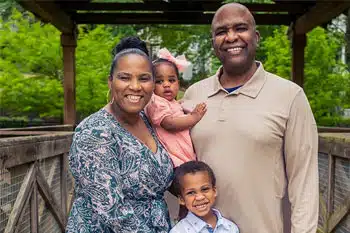
Read on as I share home study tips on what to expect and how to prepare. I’ll also provide checklists, debunk common adoption home study myths, and share a proven method for de-cluttering your house!
What is a home study?
It’s an evaluation of a prospective adoptive family that a licensed social worker completes. Having an approved home study is required by state and federal regulations to adopt.
We recommend using the time spent on your home study to get educated on the adoption process and parenting an adopted child. Your home study provider should be able to answer any of your questions that might come up. Your attorney will use your home study to file with the court. Then, the judge will review your home study before finalizing your adoption.
Information in a Home Study Includes:
- Important people in your lives
- Your background (upbringing, parents and siblings, and major life events)
- Marriage and family relationships
- Expectations for your child and the adoption
- Motive to adopt
- Feelings about infertility (if relevant)
- Parenting approach
- How you’ll integrate your child into the family
- Family environment
- Your health history
- Education
- Employment
- Finances (including your insurance coverage)
- Childcare plans
- References
- Criminal background clearances
What to Expect
Typically, the home study process has three stages. First, you’ll complete the required paperwork. In the second stage, state law normally requires at least one home visit and individual interviews of both of you.
Finally, your social worker will create a report that includes an evaluation of your family and their recommendation for adoption. The entire process takes two to four months, depending on how busy the home study worker is and how quickly you can complete your paperwork.
How to Prepare
We recommend that you get ready to answer very personal questions about your childhood, marriage, and issues. These questions include topics such as the way your parents disciplined you as a child, marriage conflict, mental health concerns, infertility issues, and financial struggles.
By asking such personal questions, the social worker is trying to see how you manage stress and difficulty. Do you have a strong support system? How have you worked through challenging issues in the past? Are you quick to recognize weakness and ask for help? By being honest about how you’ve coped during difficult times in your lives, the social worker can get a clear perspective.
Common Home Study Myths
“We need to be wealthy.”
Even though adoption can be costly, you don’t need to be well-off to get your home study approved. What’s more important than how much is in your bank account is your debt, budget, and how you spend. The social worker wants to see that you’re financially stable, pay your bills, and stay out of debt.
“Our house has to be perfect.”
A social worker isn’t expecting perfection when they walk into a home. They anticipate walking into a house that looks lived in. We promise you that the social worker isn’t going to do a white glove test!
“We must own our home.”
Couples who rent their homes can also be approved to adopt.
“Our pasts need to be spotless.”
You’re only human, and the social worker will understand that. All couples must answer questions about their criminal, medical, and social backgrounds.
“The adoptive couple will need to share whether or not they have been directly or indirectly exposed to circumstances such as alcohol/drug abuse, physical abuse, sexual abuse, mental abuse, jail, counseling, or financial issues. Truth be told, most have had some sort of exposure,” shares Linda Rotz, Lifetime’s Director of Adoption Services.
Once you discuss any issues with the social worker, they will evaluate and address the nature of the problems accordingly. Sometimes, a couple must take additional training or show growth and change in a specific area. Certain felonies would disqualify a family, but each state has its own statutes, so it would be something the social worker would have to evaluate with you.
A Checklist to Get Ready for Your Home Study
Many hopeful adoptive parents find the home study process to be overwhelming. The adoption home study checklist below will help you get ready!
We want to note that regulations differ depending on your state. We’ve made this home study checklist general enough to cover the variety of documents and clearances most will need. If your home has any safety concerns, the home study professional will usually let you know of the issue, so you have time to correct them before finishing the home study.






0 Comments